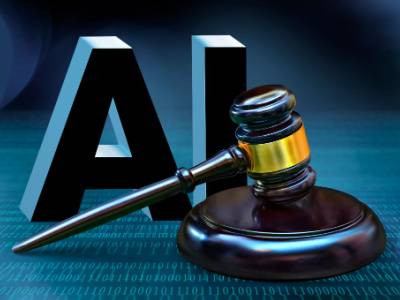 Artificial intelligence (AI) has been a hot topic over the past couple of years, and it has affected people in many different fields. While many have been impressed by how ChatGPT and other tools can generate what seems to be well-written text and eye-catching imagery, others have raised concerns about the use of this technology.
Artificial intelligence (AI) has been a hot topic over the past couple of years, and it has affected people in many different fields. While many have been impressed by how ChatGPT and other tools can generate what seems to be well-written text and eye-catching imagery, others have raised concerns about the use of this technology.
The legal field in particular has seen some scrutiny regarding the use of AI tools after a few cases in which attorneys submitted briefs or other legal documents written using ChatGPT that included fabricated information. This has led some to call for regulations regarding the use of AI, and some courts have implemented rules requiring attorneys to disclose that they have drafted documents using these tools. However, others have recognized the value that these tools may provide when used correctly.
Ensuring That Lawyers Are Educated on the Proper Use of AI
Recently, a judge in Louisiana issued an open letter discussing artificial intelligence tools as used by attorneys. He noted that while calls for regulation are understandable given concerns about whether attorneys may file documents containing inaccurate information, various rules already exist that address these issues.
Specifically, the judge noted that the American Bar Association model rules of professional conduct already address issues related to confidentiality and competence. Attorneys are required to prepare cases thoroughly using the proper preparations, including verifying that the information submitted in court is accurate. They are also prohibited from presenting incorrect statements of fact or any other information known to be false. Failure to properly verify information provided in court filings is a violation of these rules, and it could lead to penalties for attorneys.
Furthermore, the judge noted that the Federal Rules of Civil Procedure and equivalent rules in many states require attorneys to verify by signature that pleadings or motions filed in court are correct. Under these rules, attorneys may be disciplined if they fail to ensure that the information filed is accurate.
Because these rules already address situations in which lawyers may submit false or inaccurate information generated using AI, the judge believes that further regulations are unnecessary. In fact, they may be counterproductive, since advancements in technology may quickly cause them to become outdated. Unnecessary restrictions may also limit innovation and prevent lawyers from making the best use of the tools and technologies available to them.
As an alternative, the judge has called for education on the proper use of AI in an ethical manner. This can ensure that attorneys understand the benefits and drawbacks of using these tools, while also limiting potential violations of rules or ethical standards.
Elite Lawyer Recognizes Attorneys Who Use AI Correctly
People who are searching for legal services want to make sure an attorney can address their issues correctly while following all applicable rules. Elite Lawyer provides a directory of attorneys who are known to provide quality legal services for clients, have achieved recognition for their excellence, and are committed to the practice of law. Lawyers who follow all applicable rules regarding the use of AI while maintaining high ethical standards will be more likely to be recognized for the quality of the services they provide. If you have questions about whether you qualify to become an Elite Lawyer, contact us online or call 630-635-8000.

 As an attorney, building trust with your clients is essential. High levels of trust can ensure that you will have successful and long-lasting professional relationships, that you will be able to avoid miscommunications, and that you will be able to meet clients’ legal needs. When you and your clients trust each other, they will be more likely to be satisfied with the legal services you provide, and they may refer others who need legal help. There are several steps you can take to build trust with your clients, including:
As an attorney, building trust with your clients is essential. High levels of trust can ensure that you will have successful and long-lasting professional relationships, that you will be able to avoid miscommunications, and that you will be able to meet clients’ legal needs. When you and your clients trust each other, they will be more likely to be satisfied with the legal services you provide, and they may refer others who need legal help. There are several steps you can take to build trust with your clients, including: In today's digital age, having a strong online presence is crucial for businesses in all industries, including law firms. With the majority of people relying on the internet to search for products and services, it is essential that attorney websites are not only informative and visually appealing but also accessible to everyone.
In today's digital age, having a strong online presence is crucial for businesses in all industries, including law firms. With the majority of people relying on the internet to search for products and services, it is essential that attorney websites are not only informative and visually appealing but also accessible to everyone.  In recent years, marijuana legalization has become a hot topic in the United States. Several states have legalized marijuana for both medical and recreational use. In 2020, Arizona joined these states when voters passed Proposition 207. However, while people over the age of 21 are allowed to possess, transport, and use a certain amount of marijuana, they should be aware that driving while under the influence of marijuana could potentially lead to DUI charges.
In recent years, marijuana legalization has become a hot topic in the United States. Several states have legalized marijuana for both medical and recreational use. In 2020, Arizona joined these states when voters passed Proposition 207. However, while people over the age of 21 are allowed to possess, transport, and use a certain amount of marijuana, they should be aware that driving while under the influence of marijuana could potentially lead to DUI charges. When people are searching for an attorney to assist with their legal needs, they have no shortage of options. Performing an online search for a lawyer who practices law in specific areas can turn up thousands of results, and understanding whether an attorney has the knowledge, experience, and skill to provide the services a person needs is not always easy. Attorneys and law firms that are looking to market themselves to potential clients will need to determine how they can stand out from the crowd and demonstrate that they are the right choice to address specific legal concerns.
When people are searching for an attorney to assist with their legal needs, they have no shortage of options. Performing an online search for a lawyer who practices law in specific areas can turn up thousands of results, and understanding whether an attorney has the knowledge, experience, and skill to provide the services a person needs is not always easy. Attorneys and law firms that are looking to market themselves to potential clients will need to determine how they can stand out from the crowd and demonstrate that they are the right choice to address specific legal concerns.













